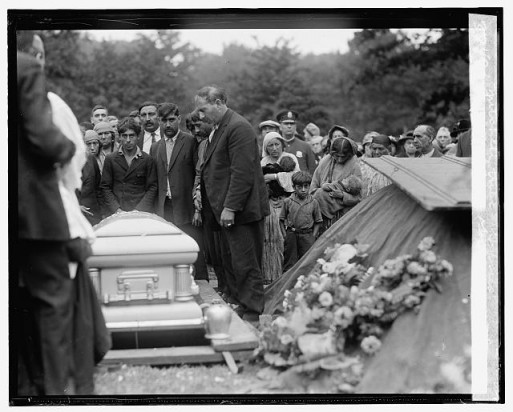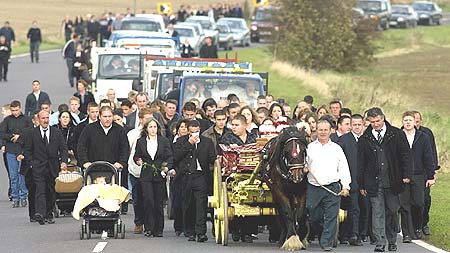Romani funeral traditions are characterized by abundance. Enormous, full of relatives, public mourning and solemn ritual, their burial rites amount to a massive procession taken very seriously by everyone involved. Their zeal may arise from a widespread belief in the supernatural. For the Romani people, spirits everywhere must be warded off by spells and charms, and people can come back from the dead to wreak revenge on the living. Thus, when someone is dying, his or her family – all who knew the person and fear for their own lives – come to stay by his or her side, ask for forgiveness, settle any strife, and leave a last good impression lest he or she return as a muló, or a type of undead, to settle last debts.
Until the funeral, family members are not supposed to bathe, shave, comb, eat or drink anything besides coffee, brandy and other liquors. Nor, above all, are they supposed to touch the body.
When the person dies, mourning becomes all-consuming. Until the funeral, family members are not supposed to bathe, shave, comb their hair, eat or drink anything besides coffee, brandy and other liquors. Nor, above all, are they supposed to touch the body. Doing so might risk marimé, or contamination, and the less connection one has with the supernatural, the better. It seems life for everyone seems put on hold until those who died can be buried.
What must it be like to witness such a display of emotion, where everyone honors the dead by wailing with their fellow survivors? It’s as if the more tears they shed, the more they belong.
On to the funeral, then. A small band might lead the procession. Mourners wear white for purity, or red for vitality, and weep. Once they enter the graveyard, the lamentation increases, reaching its peak when the coffin is lowered in the grave. What must it be like to witness such a display of emotion, where everyone honors the dead by wailing with their fellow survivors? It’s as if the more tears they shed, the more they belong.
After the funeral, all of the loved one’s possessions – and here’s the real head-turner – are burned. (So much for heirlooms). Once again, the primary concern is marimé, and family members want to destroy all material ties to the dead. Given the massive cost of such destruction, however, today many people sell the possessions – though not to other Romanis of course.
It’s a relationship as dynamic as gypsies themselves, and it keeps us on our toes…
In summary, the Romani people bear a unique relationship with death. At once resentful and reverent, they wish death away from themselves as much as possible – even to the point of burning precious belongings the rest of us would cherish – while realizing its power through their massive demonstrations of mourning. It’s a relationship as dynamic as the people themselves, and it keeps us on our toes – as it does to these mysterious, nomadic tribes, for whom the dead are always a threat. It may not be a pleasant idea of the end of life, but it’s a lively one, and at least it gives way to their grand memorials that would make the dead proud.
More from “Cultural Perspectives”:
- Oaxaca, Mexico: The Contemporary Zapotec Funeral
- Why Do We Wear Black Funeral Attire Versus White?
- In Living Color: India’s Holi Festival

 Fearing the Return of the Dead in Romani Burial Traditions
Fearing the Return of the Dead in Romani Burial Traditions




 Mishap With Grandpa’s Ashes Highlights Growing Trend to Keep Cremains at Home
Mishap With Grandpa’s Ashes Highlights Growing Trend to Keep Cremains at Home

 “Hello, Goodbye: 75 Rituals for Times of Loss, Celebration, and Change” by Day Schildkret
“Hello, Goodbye: 75 Rituals for Times of Loss, Celebration, and Change” by Day Schildkret














